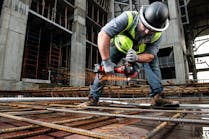Toyota supplied 20 specially-designed “Tokyo 2020 Version” e-Pallette vehicles to support athlete mobility at the Olympic and Paralympic Games Tokyo 2020. The vehicles will provide automated, loop-line transportation for athletes and related staff. The battery-electric, automated vehicles have been adapted specially for use during the games.
The Tokyo 2020 Version e-Palette has been adapted to meet the unique needs of the villages, featuring large doors and electric ramps to allow groups of athletes to board quickly and easily. The vehicle is controlled by an automated driving system capable of operating up to 12 mph, supported by an on-board safety operator.
Medalists at the Tokyo Olympic Games are also the first in history to win medals made out of recycled electrical goods—mostly mobile phones, according to ZME Science. The medals were crafted from more than six million reused mobile phone parts, part of an effort to make this year's competition environmentally friendly.
According to the article, two years before the Olympics, the organizing committee launched the “Tokyo Medal Project” to recycle old electronic gadgets such as smartphones and laptops, which would later be used to produce the medals. Billions of metals in electronic devices, such as gold and silver, get discarded every year globally.
Japan collected enough recycled material to produce 5,000 bronze, silver, and gold medals for the Olympics. Up to 90 percent of Japanese cities, towns, and villages participated by setting up donation pick-up sites where citizens donated their old devices. The recycling campaign produced 70 pounds of gold, 7,700 pounds of silver, and 4,850 pounds of bronze. The gold alone is worth some $2 million.





